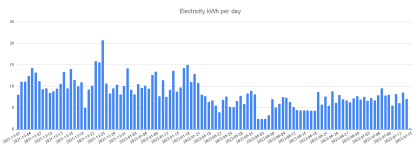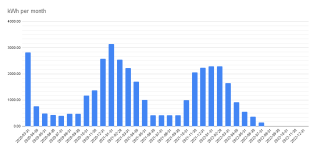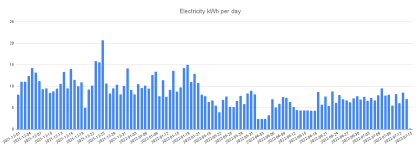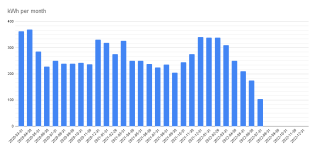I've been weighing up solar since 2020 and never made the costs work so with all the talk here of how it will pay back and how MSE is underestimating payback let's see if you can spot where my calculations have gone wrong.
Exhibit 1: daily electricity usage. Electric cooker, both wfh. Some usage data from winter, then the smart meter conked out and took months to be rebooted. Oil filled radiators used in winter to keep us warm as we work.

We paid £60 in June for Electric and annual usage is approx 3300kWh. Water tank is heated with gas atm as cheaper.
Exhibit 2: annual cycle

The front of the house is south facing but has hipped roofs and a gable above the bay window, so no ideal big expanse of roof. We're near the sea so from autumn to spring everything regularly gets covered with a film of salt. Then dust at other times.
We expect to move in 8-10 years.
Calculation
Assuming a system with a battery as then cooking in the evening is covered, say £10k installed (I'm guessing what spec we'd need from quotes posted in this thread)
Expect all our Apr-Sept electricity to be self-generated (40% annual total). Expect 20%(?) of Oct-March to be self-generated (20% of 60% = 15% of annual total).
With a current annual bill of £1100 that means an annual saving of £600.
More if we divert to heat the water tank - say 6 months of £25/month at current prices (excl standing charge and 1/6 gas for keeping the pilot light on).
£750 total. 13 years payback.
When electricity prices go up 60% then we'd save almost £1000/yr plus whatever on hot water. ~9 years payback
assuming prices don't come down again.
Hmm. Maybe now worth it due to the price rises alone. But it's marginal. Airtight double glazing could be a better investment.
Any bad assumptions in my calculation?








